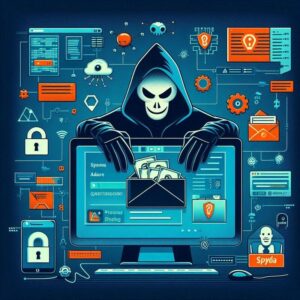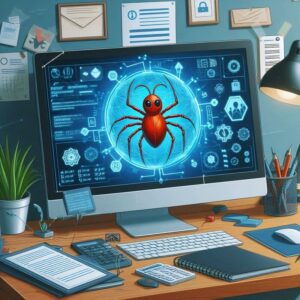Protect Your PC with a Virus Check
Regular PC virus scans are essential for keeping your computer secure and functioning correctly. Viruses, malware, and other malicious software can cause problems, such as slowing down your system and stealing sensitive data. Regularly scanning your computer for viruses lets you detect and delete threats before they cause significant harm.
The key reason for regular virus checks is to protect personal and financial information. Malware can be engineered to steal passwords, credit card numbers, and other personal data, putting you at risk of identity theft and fraud. Furthermore, viruses and other potentially harmful software might cause your computer to crash or become unworkable, resulting in lost work and productivity. Regular virus scans can protect your PC from these threats while protecting vital information.
Regular virus scans ensure your computer’s security and operation. Malware can consume system resources and cause your computer to run slowly, making everyday tasks difficult. When you scan your computer for viruses regularly, it will perform more smoothly and effectively. This includes continuous work, internet access, and a computer that is always ready when needed. Regular PC virus scans are a simple yet efficient approach to secure your personal information, keep your machine running smoothly, and minimise security issues.

Central Points to Remember
- Regular PC virus checks are essential to ensure the security and performance of your computer.
- Malware poses a significant threat to your PC, including data theft, system damage, and privacy invasion.
- Performing a PC virus check involves using antivirus software to scan for and remove malicious programs.
- Choosing the suitable antivirus software for your needs involves considering factors such as real-time protection, system impact, and additional features.
- Scheduling regular malware scans is crucial to maintaining the security of your PC and preventing potential threats.
- Additional steps for PC security include keeping your operating system and software updated, using strong passwords, and being cautious of suspicious emails and websites.
- If your PC is infected, disconnect from the internet, run a full virus scan, and seek professional help.
- Understanding Malware and Its Threat to Your PC
“Malware” refers to a large class of malicious programs that seek to harm, disrupt, or otherwise interfere with an electronic system. This encompasses viruses, worms, Trojans, ransomware, spyware, and adware. Each type of malware has a distinct goal and method of attack, but they all pose a significant threat to your computer’s security and functionality.
The most common type of malware is viruses, designed to replicate and propagate from one machine to another. They can create a variety of concerns, including file deletion and identity theft. Worms, like viruses, can spread without the requirement for a host programme, making them extremely deadly. On the other hand, Trojans masquerade as genuine software to trick users into installing them, allowing thieves access to sensitive data or control over the infected computer.
Ransomware is a malicious virus that encrypts a victim’s files and demands payment to decrypt them. Spyware and adware are applications designed to collect information about users’ browsing habits and display unwanted advertisements. Regardless of the type of malware, it is vital to identify potential threats to your computer and take precautions to guard against them.
How to Perform a PC Virus Check
A PC virus scan is straightforward and may be conducted with antivirus software. The latest antivirus programs have real-time protection and frequent scanning features to discover and remove viruses from your computer. Launch your antivirus application to perform a virus scan, then select the option to run a full system scan. This will initiate a complete scan of all files and programs on your computer, looking for malware signs.
In addition to full system scans, many antivirus programs allow you to do quick or customised checks on individual files or folders. Quick scans are great for checking for potential threats, but custom scans allow you to target specific areas of your computer that you suspect may be infected. To keep your computer malware-free, run these scans regularly.
Running antivirus software is crucial to computer security but is not the only step. Equally important is updating your operating system and other applications with the most recent security patches. Many malware assaults exploit holes in obsolete software; thus, keeping everything updated is vital to preserving your PC’s security. Taking these measures and running regular virus scans can help safeguard your computer from potential security risks.

Choosing the Right Antivirus Software for Your Needs
When choosing antivirus software for your computer, you must evaluate various factors to guarantee you receive the finest program for your needs. The first consideration is the level of security offered by antivirus software. Look for a program that includes firewall, email, and online security features, as well as real-time malware protection. These features can help prevent malware from infecting your computer in the first place.
Another essential factor to consider is the usability of the antivirus software. You should be confident in your ability to install and operate it since it has a straightforward interface that allows you to perform virus scans and modify security settings effortlessly. Also, consider how the antivirus software impacts the operation of your computer. Some antivirus programs may be resource-intensive and slow down your computer; therefore, choose one that gives strong protection without sacrificing performance.
Consider the antivirus software company’s reputation and track record. Look for courses from reputable businesses with a track record of delivering dependable security solutions. Review websites and credible suggestions will allow you to make an informed decision about which antivirus software is best for you. By taking these factors into account and selecting the best antivirus software for your needs, you may help protect your computer from potential security threats.
Scheduling Regular Malware Scans
In addition to manual virus checks, schedule regular malware scans to keep your computer safe from threats. Most antivirus programs allow you to schedule automatic scans, such as daily, weekly, or monthly. By scheduling regular scans, you can ensure that your machine is regularly inspected for malware without having to start them manually.
Schedule regular malware scans, particularly for busy persons who may not have time to perform manual virus checks regularly. Setting up automatic scans gives you peace of mind, knowing your computer is frequently scanned for potential threats without further effort. This may assist in maintaining your PC’s security and performance without requiring constant monitoring.
Remember to allow for time flexibility when scheduling malware scans. This prevents disruptions to your job or other activities. For example, scheduling scans during off-peak hours when your computer is inactive can help ensure they do not interfere with your work. By taking charge of your PC’s security with regular, well-timed scans, you may reduce disruptions to your everyday routine.
Additional Steps for PC Security
In addition to performing regular virus checks and scheduling malware scans, there are several other things you can do to strengthen the security of your PO. A critical tactic is to use two-factor authentication whenever possible and strong, unique passwords across all your online accounts. Even if your credentials have been compromised, this can help prevent unauthorised access to your accounts.
It’s also important to be cautious when browsing the internet and downloading files or programs. Avoid downloading files from unknown sources, and use caution when clicking on suspicious links that may include malware or other security threats. Be wary of phishing attempts, which include criminals tricking you into providing sensitive information through phoney emails or websites.
Another vital step towards PC security is to regularly back up your essential files. If dangerous malware infects your computer or your hardware fails, keeping backups of your files may help prevent losing important data. Consider using a cloud storage service or an external hard drive to back up your files and keep them safe.
Finally, it is vital to keep up with the latest security dangers and best practices for PC security. Stay current on malware threats and security flaws and take proactive steps to protect your computer. These additional PC security steps help strengthen your computer’s defences against prospective attacks.

What to Do If Your PC Is Infected
Despite taking proactive steps to protect your computer, it is always conceivable that it will become infected with malware. However, if you suspect your computer has been infected, remember that there are numerous steps you may take to resolve the issue and mitigate the infection’s impact.
If you suspect your computer has viruses, launch your antivirus program and complete a system scan. If the scan detects any risks, follow the antivirus program’s instructions to quarantine or delete the impacted files. In rare cases, you may need to boot into safe mode before running a scan to ensure that all harmful software has been detected and removed.
If your antivirus software cannot eliminate the infection or your computer still has signs of malware after a scan, contact a professional IT support or computer repair service. They can use professional equipment and abilities to clean and restore your computer to a secure state properly.
In addition to dealing with the initial infection, you should prevent future infections by upgrading your antivirus software and applying additional security measures such as changing passwords and reviewing recent internet activity for signs of unauthorised access.
Finally, remember that doing frequent PC virus scans is essential to ensuring your computer’s security and efficiency. Understanding the various types of malware and their potential risks will enable you to defend yourself proactively. You may actively contribute to the safety of your computer by running virus scans regularly, scheduling automatic malware scans, choosing the best antivirus application for your needs, and taking additional PC security safeguards. If your computer becomes infected despite these safeguards, promptly addressing the virus and preventing future infections is vital to minimise the impact on your machine’s security and performance.
FAQs
What is a PC virus check?
A PC virus check scans a computer system for potential viruses, malware, or other malicious software that may have infected it.
Why is it essential to perform a PC virus check?
Performing a PC virus check is essential to ensuring the security and integrity of your computer system. Viruses and malware can damage your files, steal personal information, and disrupt the normal functioning of your computer.
How often should I perform a PC virus check?
It is recommended to perform a PC virus check regularly, at least once a week, to ensure that your computer is protected from any new threats that may have emerged.
What are some signs that my computer may be infected with a virus?
Some signs that your computer may be infected with a virus include slow performance, frequent crashes, pop-up ads, unauthorized file changes, and unusual error messages.
What are some widespread PC virus check software programs?
Some widespread PC virus checks software programs include Norton Antivirus, McAfee, Avast, Kaspersky, and Bitdefender. These programs can scan your computer for viruses and malware and remove any threats that are found.
Are there any free PC virus check options available?
Several free PC virus check options, such as Windows Defender (built into Windows operating systems), Avast Free Antivirus, AVG Antivirus Free, and Malwarebytes, are available. These programs offer basic virus scanning and removal capabilities at no cost.
References
Stay Safe Online: Tips for Preventing Ransomware on Your Dell Device – Ask.com. https://www.ask.com/news/stay-safe-online-tips-preventing-ransomware-dell-device
Beyond the Blue Screen of Death: Exploring Common Causes and Solutions for Computer Crashes and How to Prevent Them | 01. https://vocal.media/01/beyond-the-blue-screen-of-death-exploring-common-causes-and-solutions-for-computer-crashes-and-how-to-prevent-them
The post Protection Against Computer Viruses appeared first on Ezi Gold.
The Article Protection Against Computer Viruses Was Found On https://limitsofstrategy.com




Comments are closed